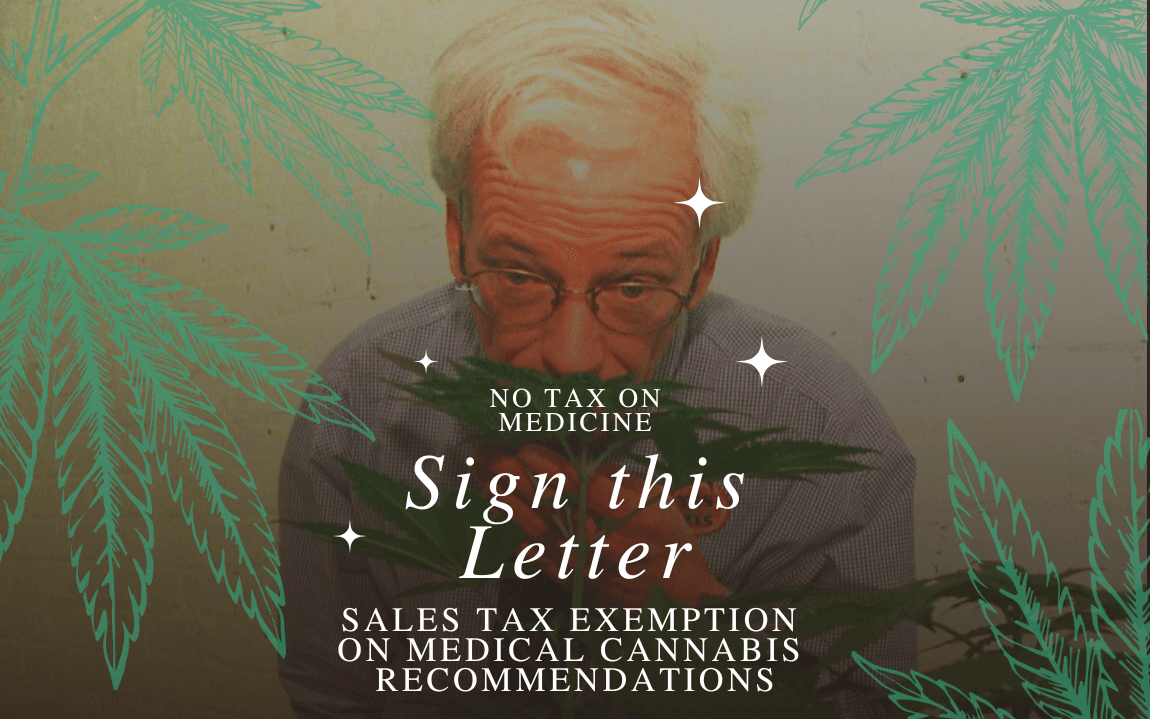We need your support. The cannabis industry is seeking help in addressing California's inconsistent tax policies as it relates to medical cannabis patients.
On behalf of California's leading cannabis trade, labor, advocacy, veterans, and patient organizations, as well as individual stakeholders throughout the industry, we've drafted this letter to address the inconsistencies to help further Medical Cannabis Patient Equity and Access with 97 industry signatures and counting. Read the full text below and show your support now.
The Highlights
- Proposal: All Patients with valid doctor’s recommendation should be exempt from sales tax, which is the same treatment given for medical marijuana identification cards
- Prop. 215 still protects qualified patients; Prop. 64 maintains this protection
- Current sales tax policy discriminates against patients without medical marijuana identification cards
- Compassion program patients are exempt from sales tax with a recommendation, but few such programs exist
- Exempting patients with a recommendation from sales tax will disincentivize illicit market purchases by patients on a budget.
Take Action
Sign Your Support for Meadow's "No Tax on Medicine" Campaign
The Full Letter

Dear Governor Newsom, President Atkins, and Speaker Rendon:
On behalf of California's leading cannabis trade, labor, advocacy, veterans, and patient organizations, as well as individual stakeholders throughout the industry, we write to seek your help in addressing California's inconsistent tax policies as it relates to medical cannabis patients.
Our position is that cannabis patients should not be subject to California Sales Tax if they possess a valid doctor's recommendation for the therapeutic use of cannabis. This position is supported by California law. In all other cases, save individual taxation, including untaxed cannabis disbursement to a patient pursuant to a Compassion Program, a doctor’s recommendation is considered sufficient to exempt one from payment of sales taxes. We are hopeful that you will work with us to correct the one remaining inconsistency: State sales taxes imposed on medical cannabis patients who are not part of Compassion Programs.
Prop. 215 still exists. The definition of “Qualified Patient” still includes any Californian who uses cannabis for medical purposes with a valid physician’s recommendation (1). Qualified patients have never been – and still are not required, by design – to register or obtain an identification card in order to qualify for the legal protections of Prop. 215. Indeed, the Adult Use of Marijuana Act (“Prop. 64”), which legalized commercial adult use of cannabis, includes the strongest language possible restricting changes to Prop. 215 – “[n]othing in this section shall be construed or interpreted to amend, repeal, affect, restrict, or preempt laws pertaining to the Compassionate Use Act of 1996.”(2) However, California’s sales tax policy discriminates sharply between qualified patients with and without identification cards – one pays sales tax and the other does not. This policy has no legal or policy justification that is consistent with the voter-endorsed provisions of Prop. 215 and Prop. 64. Until voters say differently, all qualified patients should be afforded sales tax relief, not just those with the geography or resources to register for a county identification card. Why is California making medical cannabis more expensive for certain patients over others?
According to a February 2, 2022, email from Christina Dempsey, Acting Deputy Director of External Affairs of the DCC, per the regulations, “either an ID card or a physician's recommendation is acceptable for compassion care patients.”(3)
Patients enrolled in a compassion program are exempt from sales tax. However, patients who cannot find a compassion program in their area or can’t qualify for such a program must pay State sales tax at the check-out counter, despite the fact that they are medical cannabis patients in possession of the very same document (a valid doctor’s recommendation) which qualifies a medical cannabis patient enrolled in a compassion program for a sales tax exemption.
It should be noted that compassion programs are voluntary programs underwritten by dispensaries or specific programs funded by donations. At a time when most cannabis businesses are facing extinction due to taxation, over-regulation, and a huge illicit market, few are able to offer compassion programs. Proof of this rests in the annual report on Tax Exemptions for Medicinal Cannabis published by the Legislative Analyst’s Office (see https://lao.ca.gov/Publications/Report/4608) which shows a shockingly low number of compassion program tax exemptions.
As demonstrated by the LAO Report referred to above, compassion programs in California are largely non-existent. Given this, the only way to ensure that patients, particularly those who are poor, are treated equally under the Tax and Revenue Code is to allow all patients possessing a valid doctor’s recommendation relief from California’s Sales Tax.
Currently, compassion program patients need only a doctor’s recommendation for tax relief. Patients who are not attached to a compassion program must acquire a state-issued Medical Marijuana Identification Card (MMIC) in addition to their doctor’s recommendations to qualify for tax relief. Excluding a patient from the tax exemption based solely upon registering for a state-issued card is arguably discriminatory, in that it excludes tax relief for those without the ability to pay for the card, regardless of their medical need.
The intention of Prop 64 was not only to expand legal access to adult-use cannabis but also to preserve a well-established medical cannabis market. However, in California today, we have a contracting medical market, dropping from 3,080 MMIC card holders in 2021 to just 1,279 card holders in 2022. Offering sales tax relief to cannabis patients would still require them to pay the excise tax, which when combined with local taxation, brings the total tax burden down to an affordable level, mirroring what patients paid in taxes prior to legalization.
Prior to legalization, there were millions of California patients with doctor’s recommendations, achieving over $2.5B in medical sales in 2017. Post legalization, due to unbearably high taxes, medical cannabis patients have been forced to seek their medicine in the unregulated market, where untested products have already been a proven danger to their health, as the Evali Crisis has demonstrated. The State has lost millions in excise taxes as well.
Medicine is not subject to California sales tax (see CDTFA Regulation 1591). In the interests of fairness, equity, and compassion this should apply to medical cannabis patients as well.
Our organizations view exempting all cannabis patients from California Sales Tax as critical in providing an affordable pathway for patients. Medical cannabis patients who are relieved of California Sales Taxes will be disincentivized from illicit market purchases. Their return to the regulated market will increase the excise tax and local tax revenue.
We are hopeful that this change can be included in legislation contemplated by the Governor in the remainder of this year’s legislative season. Our representative, David Hua, will be contacting your offices shortly to ascertain whether virtual meetings to discuss the above might be possible. Should you have any questions or concerns David Hua can be reached at: David@getmeadow.com or (415) 212-8985


*signatures as of 4/12/23; add your name by completing this form
Cc:
The Honorable Members of the Assembly Budget Committee
The Honorable Members of the Senate Budget Committee
Ms. Nicole Elliott
Mr. Stuart Thompson
Mr. Jano Dekermenjian
Ms. Darci Sear
Mr. Matthew LeeReferences:
(1) Under the Compassionate Use Act (“Prop. 215”), a “Qualified Patient” is “a person who is entitled to the protections of Section 11362.5, but who does not have an identification card issued pursuant to this article.” (Cal Health & Saf Code § 11362.7) (emphasis added). Section 11362.5, which includes the language voters supported when passing Prop. 215 also remains, which specifically protects “patients and their primary caregivers who obtain and use marijuana for medical purposes upon the recommendation of a physician are not subject to criminal prosecution or sanction. (Cal Health & Saf Code § 11362.5) (emphasis added).
(2) Cal. Health & Safety Code 11362.3 (c).
(3) See 4 C.C.R §15411 (b) (1) of the adopted cannabis emergency regulations, which reflects this statement and the authority cited above regarding Prop. 215 (Cal. Health & Safety Code Sections 11362.5, 11367


